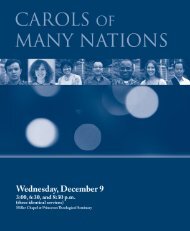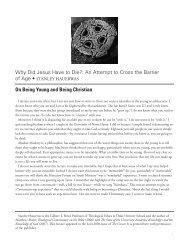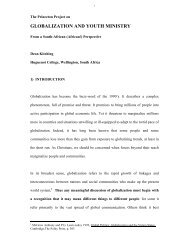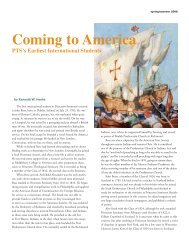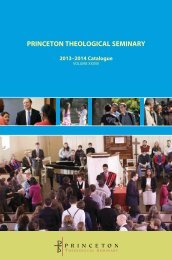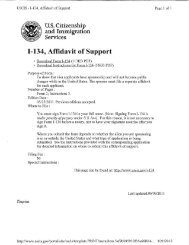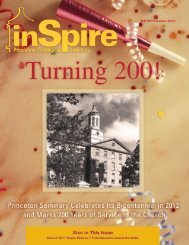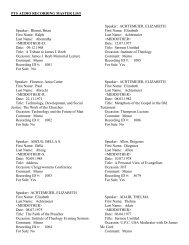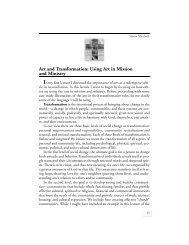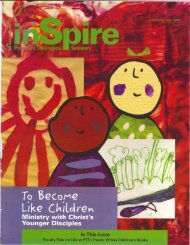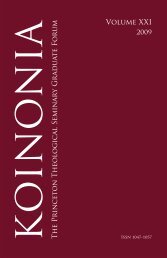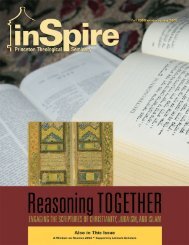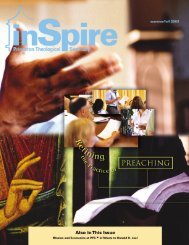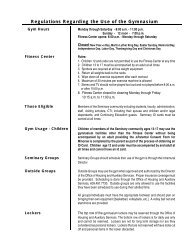P E R S P E C T I VAS - Princeton Theological Seminary
P E R S P E C T I VAS - Princeton Theological Seminary
P E R S P E C T I VAS - Princeton Theological Seminary
Create successful ePaper yourself
Turn your PDF publications into a flip-book with our unique Google optimized e-Paper software.
Perspectivas/Occasional Papers • Fall 2006NOTES1 Daniel L. Smith-Christopher, “Between Ezra and Isaiah: Exclusion, Transformation,and Inclusion of the ‘Foreigner’ in Post-Exilic Biblical Theology” in Ethnicity and theBible, Edited by Mark G. Brett (Leiden: E.J. Brill, 1996): 117-142.2 Harold V. Bennett, Injustice made Legal. Deuteronomic Law and the Plight of Widows,Strangers, and Orphans in Ancient Israel (Grand Rapids, Michigan: W. B. Eerdmans,2002): 45-48. José E. Ramírez Kidd, Alterity and Identity in Israel. The (ger) in the OldTestament (BZAW 283; Berlin: Walter de Gruyter, 1999). Weston W. Fields, Sodom andGomorrah. History and Motif in Biblical Narrative, (JSOTSup, 231: Sheffield: JOSTPress, 1997), chapter 2. C. von Houten, The Alien in Israelite Law (JSOTSup, 107:Sheffield: JOST Press, 1991). Ronald de Vaux, Ancient Israel: Social and ReligiousInstitutions, vols. 1 and 2 (New York: McGraw-Hill, 1961). Frank A. Spina, “Israelitesas gerim, ‘Sojourners,’ in Social and Historical Context,” in The Word of the LordShall Go Forth, ed. Carol L. Meyers and M. O’Connor (Winona Lake, Ind.:Eisenbrauns, 1983). Christoph Bultmann, Der Fremde im Antiken Juda (Goettingen:Vandenhoeck & Ruprecht, 1992). Epsztein, Leon, Social Justice in the Ancient Near Eastand the People of the Bible (London: SCM Press, 1986).3 This writer follows those interpreters that see in the Deuteronomist’s legalinstructions an attempt to promote a commitment to some forms of justice andwelfare for vulnerable sectors in Israelite society. See, F.C. Frensham, “Widow,Orphan, and the Poor in Ancient Near Eastern Legal and Wisdom Literature,”Journal of Near Eastern Studies 21 (April 1962): 129-139. H. Eberhard von Waldow,“Social Responsibility and Social Structure in Early Israel,” Catholic BiblicalQuarterly 32 (1970):182-204. P.C. Craigie, The Book of Deuteronomy (Grand Rapids: W.B. Eerdmans, 1976): 233-234, 244-247, 310-324. Leon Epsztein, Social Justice in theHebrew Bible in the Ancient Near East and the People of the Bible, translated by JohnBowden (London: SCM Press, 1986). A. D. H. Mayes, Deuteronomy (Grand Rapids:W. B. Eerdmans, 1991): 245-246; 259-261; 326-327. Bruce V. Malchow, Social Justice inthe Hebrew Bible (Collegeville, Minn.: Liturgical Press, 1996): 8-30. For a challenge tothis line of interpretation see, Harold V. Bennett, Injustice made Legal. DeuteronomicLaw and the Plight of Widows, Strangers, and Orphans in Anicente Israel (Grand Rapids,Michigan: W. B. Eerdmans, 2002).4 The following quotations on the rights of migrant workers are taken from “TheInternational Convention on the Protection of Rights of All Migrant Workers andMembers of Their Families” of the United Nations.(http://www.unhchr.ch/html/menu3/b/m_mwctoc.htmIMMIGRATION AND THEOLOGY: REFLECTIONS BYAN IMPLICATED THEOLOGIANOrlando O. EspínDr. Orlando Espín is professor of Systematic Theology at theUniversity of San Diego, where he also directs the Center forthe Study of Latino/a Catholicism. He has been a member ofthe HTI’s Selection Committee and a mentor to a number ofHTI fellows. His published works include, among others,Power and Memory: Toward an Intercultural Theology ofTr a d i t i o n (Orbis Books, 2006), and Futuring Our Pat:Explorations in the Theology of Tradition, coed. with G. Macy(Orbis Books, 2005).Anyone who has read the Hebrew and Christian Scripturesknows that theological reflection on immigration is as oldas the Bible, and older. However, the present context andreasons for immigration are not what they were in the biblical orecclesial past, and so with biblical and ecclesial insights we mustalso take into consideration the new issues and realities that ourforebears did not and could not have considered.As all of you know, I am Roman Catholic. Consequently, I willbe speaking from within my theological tradition, although I suspectthat most of what I will suggest here will be acceptable inother Christian theological traditions. I have been a U.S. citizen formost of my life, but I came to the U.S. as a young immigrant—andso, I am personally implicated in my own reflections.3637



